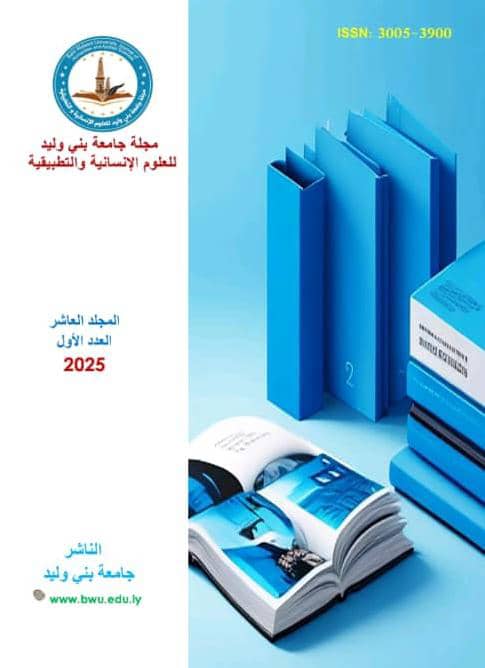The role of national integration in achieving economic stability in the Libyan state_ A forward-looking vision
DOI:
https://doi.org/10.58916/jhas.v10i1.691Keywords:
National integration, economic stability, Libyan state, revolution, national reconciliation.Abstract
After nearly fourteen years have passed since the events of February, it seems that the situation in Libya is still stagnant, and the transitional phase is still fraught with serious risks that affect national integration, which negatively affects economic stability. After the events of February 17 and the fall of the former regime, Libya faced complex problems like many countries that went through transitional stages, whether in its neighborhood or in other parts of the world. Most of these problems are related to the legacy of the authoritarian state and what it has accumulated since its establishment of violence, repression, distortion of values, instilling hatred, and reviving regional and tribal strife. With the growth of these conflicts, the state began to search for solutions that would end this political debate and achieve security stability, which in turn would be reflected in achieving economic development for the Libyan state, which requires an interactive strategy to overcome internal economic obstacles as well as the external repercussions of international conflicts that cast their shadows on the economies of the Middle East, including, of course, the Libyan economy. Accordingly, the problem of the current research can be crystallized into a main question: To what extent can the national integration process contribute to achieving economic stability in the Libyan state in light of current and future challenges?
Downloads
References
Ibrahim, Hassanein Tawfiq, “The Crisis of the Political Elite and the Stumbling of the Revolution’s Paths,” Democracy Magazine (Issue 51, July 2013), p. 25.
Zakaria, Bouroni, The Political Elite and the Problem of Democratic Transition: A Case Study of Algeria (Master’s Thesis, Department of Political Science, Faculty of Law, University of Mentouri/Constantine, 2009/2010), p. 89.
Hilal, Ali al-Din, “Political Elites between the Hammer of Globalization and the Anvil of Democracy,” Democracy Magazine (Fourteenth Year, Issue 53, January 2014), pp. 10,9.
Hariq, Elia, “Al-Saratiya and the Democratic and Social Transformation in Modern Arab Society,” Al-Mustaqbal Al-Arabi Magazine (Beirut: Center for Arab Unity Studies, Year 8, Issue 80, October 1985), p. 4.
For more details, see: Kupperman, Alan, The Backlash of International Interventions: Libya as a Model, Foreign Affairs (March/April 2015 issue).
Amnesty International issued a report revealing about 93 cases of attacks on Libyan journalists in the first nine months of 2014. The report concluded that the ongoing attacks in eastern Libya “amount to war crimes.” As a result of this widespread violence, the United Nations estimates that about 400,000 Libyans have fled their homes, while 100,000 Libyans have been displaced outside their country.
Media reports have exaggerated the number of Libyan deaths – especially civilians – in the first days of the fighting, with Human Rights Watch documenting 233 cases. Deaths only in the first days of the fighting, not 10,000, as reported by Al Arabiya News Channel. In Misrata, Libya’s third largest city, where the initial fighting was most intense, Human Rights Watch found that out of 949 casualties in the first seven weeks of the revolution, 30 were women and children (about 3%), indicating that Gaddafi’s forces had targeted fighters with precision.
Al-Mezma Center for Studies and Research, The Libyan Situation: Searching for a Roadmap for the Current Political, Security, and Future Situation in Libya (Cairo: Arab Spring Institute, January 2014), p. 2.
Jumaa, Muhammad, The Parallel Balance: Tribal Movements Opposing Salafi Jihadism in Libya, Al-Ahram Egyptian Newspaper, (5/20/2015). 10. Al-Munsif, and Nas, “The Tribe and Authority in Libya,” Al-Maghrib Al-Muwahhid Magazine (Issue 12, May 2011), p. 19.
Libyan Tribes, Al-Jazeera Net, at the link: http://www.aljazeera.net/news
The same previous reference.
Boutaleb, Muhammad Najib, previously cited reference, pp. 10, 11.
Al-Sawani, Youssef Muhammad Juma, “Libya after Gaddafi,” previously cited reference, p. 13.
Al-Sawani, Youssef Muhammad Juma, “Libya and the Revolution,” previously cited reference, p. 138.
Al-Mizma Center for Studies and Research, previously cited reference, p. 4
Mr. Abu Dawood, The Future of the Libyan Revolution after the Legislative Elections, Islam Today, at the link: http://www.islamtoday.net/bohooth/services/saveart-14-171426.htm .
Mukhaimer, Osama, “The Situation in Libya from Revolution to Stagnation,” Akhbar Al-Sa’a, (Issue 4521, April 2012).
Al-Sheikh, Muhammad Abd al-Hafiz, “Challenges of National Reconciliation in Libya after 2011,” Al-Mustaqbal Al-Arabi Magazine (Issue 431, January 2015), pp. 101, 102.
Hamdi, Zuhair, “Three Years after the Libyan Revolution: Challenges and Outcomes,” in Arab Policies, (Doha: Qatar, Arab Center for Research and Policy Studies, Issue 7, March 7, 2014), p. 91.
Al-Barouni, Elias Abu Bakr, Dialogue and National Reconciliation, Libyan Affairs Program, Libya FM Channel, see the following link: https://www.facebook.com/elyas.albarouni.1
Zaqoud, Abdul Salam Juma, The Path of National Reconciliation and Social Peace, (Amman: Jordan, Dar Al-Zahran Publishing House, 2012).
Al-Barouni, Elias Abu Bakr, The Constituent Assembly Committee for Writing the Constitution on Time, Al-Jazeera Satellite Channel, dated 2-5-2014, see the following link: https://www.facebook.com/elyas.albarouni.1













